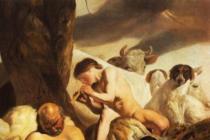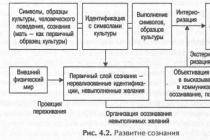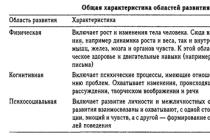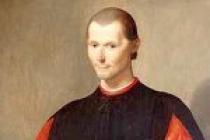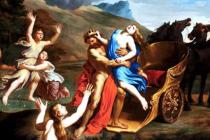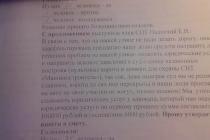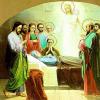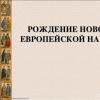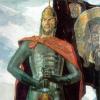Niccolo Machiavelli is a prominent Italian politician, historian, military theorist and philosopher, the founder of the “doctrine of political realism.”
Machiavelli was born in Florence. From 1498 to 1512 was in public service as secretary of the second chancellery of the Florentine Republic. During this period, Machiavelli acquired experience and knowledge of political institutions and human morals, which was reflected in his writings.
The most important problems of Machiavelli's philosophy were the reasons for the rise and fall of states, the conditions for the creation of a strong state, the role of the ruler in it, the influence of the individual on the course of historical events, the motives of human actions. Machiavelli's main works are “The Prince”, “Discourses on the First Decade of Titus Livius”, “Dialogue on the Art of War”.
Machiavelli's theory of the state
Machiavelli was one of the first philosophers of the Renaissance to reject the theocratic concept of the state, according to which the state depends on the church as the highest authority on Earth. He believed that political systems are born, achieve greatness and power, and then decline, decay and perish, i.e. do not depend on divine predestination. The state and the nature of the laws reigning in it, Machiavelli believes, must be understood based on reason and experience.
Machiavelli argues that social and legal views, the civil virtues of people, can only be taught by the state, not the church. On the contrary, the church shook the foundations of state power, trying to combine spiritual and secular power in its hands, and weakened the desire in people to serve the state. The state is the highest manifestation of the human spirit; in serving him, Machiavelli sees the purpose and happiness of human life.
Machiavelli considers a republic to be the best form of state, but its establishment is possible only under certain specific historical conditions. Critically assessing the political situation of his country, the character of citizens completely devoid of civic virtues, Machiavelli comes to the conclusion that it is impossible to unite Italy under a single republican government. He is convinced that Italian reality requires the establishment of autocracy and the creation of a strong independent national state.
In his treatise, The Prince, Machiavelli discusses ways to create a strong state. He believes that any means can be used to achieve this goal, including violence, murder, deception, and betrayal. Thus, Machiavelli is responsible for the justification of the principle: the end justifies the means, according to which the means used by a politician are justified by the goals that he sets for himself.
To establish a strong state, Machiavelli sacrifices morality and the good of the individual. Moral principles apply only to the private lives of people, not to politics. State interest is paramount. Machiavelli wrote that whenever one has to discuss a question on which the salvation of the state solely depends, one should not stop at any considerations of justice or injustice, humanity or cruelty, glory or shame. Subsequently, the term “Machiavellianism” appeared, denoting a policy that neglects moral laws and uses inhumane means to achieve political goals.
With this vision of the state, a special role in it belongs to the ruler.
The doctrine of political power and the qualities that a ruler should possess
The power of the ruler in Machiavelli's understanding is unlimited. The basis of government and law is force, which destroys everything that is contrary to state interests (the ideal of strong power). That is why a ruler can ignore moral laws in his activities.
Also, the sovereign must take into account the evil nature of man. The philosopher believes that the motivations for people's activities are selfishness and material interest. People, according to Machiavelli, are “ungrateful, fickle pretenders, fleeing from danger, greedy” and would rather forget the death of their father than the deprivation of property.
Machiavelli believes that “everyone admits that it would be best if there were a Prince with all the qualities recognized as good, but since the very conditions of human existence do not allow them to have them all and to carry them out steadily, the Prince must be so prudent that be able to avoid the shame of those vices that could deprive him of the state... And he can also not be afraid of condemnation for those vices without which it is difficult to maintain the state.”
The head of state “should not reckon with reproaches of cruelty, if only such glory is necessary in order to keep his subjects in unity and obedience. After all, one who confines himself to very few exemplary punishments will be more merciful than those who, due to inappropriate mercy, allow disorder to grow, giving rise to murders and robberies, for the latter constitute a disaster for the entire society as a whole, while the punishments coming from the Prince concern only individuals.”
What is better for a ruler - to be loved or to be feared? Of course, it would be good to be both loved and feared. However, since it is very difficult, simply impossible, to combine these two feelings, it is better to be afraid. “Love is supported only by a relationship of obligation, which is broken due to the depravity of people in any collision with personal interest, while fear is maintained by the fear of punishment, which never ceases to act.” At the same time, the sovereign must inspire fear without incurring hatred.
The sovereign must be careful not to be considered frivolous, cowardly, and indecisive. He must make every effort to ensure that his decision is irrevocable, and that the general opinion of him is such that no one would even think of deceiving him. As for fidelity to his promises, the ruler can neglect them if such observance can turn against himself and the interests of the state.
To summarize, it is necessary to note the ambiguity of Machiavelli’s social and philosophical views. On the one hand, an important contribution to the history of the development of the theory of state and power was his approach to the problem of the state from a secular perspective, based on historical data and taking into account the real political situation. On the other hand, Machiavelli advocates the idea that any means are acceptable to achieve political goals. The good of the state, in his opinion, can be associated with violence, murder, deception, and disregard for moral principles. However, this is impossible, since the good of the state can only be achieved on moral and legal values.
Did you know,
What is a thought experiment, gedanken experiment?
This is a non-existent practice, an otherworldly experience, an imagination of something that does not actually exist. Thought experiments are like waking dreams. They give birth to monsters. Unlike a physical experiment, which is an experimental test of hypotheses, a “thought experiment” magically replaces experimental testing with desired conclusions that have not been tested in practice, manipulating logical constructions that actually violate logic itself by using unproven premises as proven ones, that is, by substitution. Thus, the main task of the applicants of “thought experiments” is to deceive the listener or reader by replacing a real physical experiment with its “doll” - fictitious reasoning on parole without the physical verification itself.
Filling physics with imaginary, “thought experiments” has led to the emergence of an absurd, surreal, confused picture of the world. A real researcher must distinguish such “candy wrappers” from real values.
Relativists and positivists argue that “thought experiments” are a very useful tool for testing theories (also arising in our minds) for consistency. In this they deceive people, since any verification can only be carried out by a source independent of the object of verification. The applicant of the hypothesis himself cannot be a test of his own statement, since the reason for this statement itself is the absence of contradictions in the statement visible to the applicant.
We see this in the example of SRT and GTR, which have turned into a kind of religion that controls science and public opinion. No amount of facts that contradict them can overcome Einstein’s formula: “If a fact does not correspond to the theory, change the fact” (In another version, “Does the fact not correspond to the theory? - So much the worse for the fact”).
The maximum that a “thought experiment” can claim is only the internal consistency of the hypothesis within the framework of the applicant’s own, often by no means true, logic. This does not check compliance with practice. Real verification can only take place in an actual physical experiment.
An experiment is an experiment because it is not a refinement of thought, but a test of thought. A thought that is self-consistent cannot verify itself. This was proven by Kurt Gödel.
(Italian) Russian and contained a request to recognize the right of his family to the disputed lands of the Pazzi family.Carier start
In the life of Niccolo Machiavelli, two stages can be distinguished: during the first, he was mainly involved in government affairs. In 1512, the second stage began, marked by the forced removal of Machiavelli from active politics and the writing of works that would later make his name famous.
Machiavelli's life passed in an interesting but dangerous era, when the Pope could have an entire army, and the rich city-states of Italy fell under the rule of foreign states - France, Spain or the Holy Roman Empire. It was a time of unreliable alliances, corrupt mercenaries who abandoned their rulers without warning, when power collapsed in a few days and was replaced by a new one. Perhaps the most significant event in this series of chaotic upheavals was the fall of Rome in 1527. Rich cities like Genoa suffered much the same as Rome five centuries ago, when it was burned by an army of barbarian Germans.
In 1494, the army of the French king Charles VIII entered Italy and reached Florence in November. Young Piero di Lorenzo de' Medici, whose family ruled the city for almost 60 years, hastily went to the royal camp, but achieved only the signing of a humiliating peace treaty, the surrender of several key fortresses and the payment of a huge indemnity. Piero did not have the legal authority to enter into such an agreement, especially without the sanction of the Signoria. As a result, he was expelled from Florence by the indignant people, and his house was plundered.
The monk Savonarola was placed at the head of the new embassy to the French king. During this troubled time, Savonarola became the real ruler of Florence. Under his influence, the Florentine Republic was restored in 1494 and republican institutions were returned. At the suggestion of Savonarola, the “Great Council” and the “Council of Eighty” were established.
After the execution of Savonarola, Machiavelli was re-elected to the Council of Eighty, responsible for diplomatic negotiations and military affairs, thanks to the authoritative recommendation of the Prime Secretary of the Republic, Marcello Adriani (Italian) Russian, a famous humanist who was his teacher.
Formally, the First Chancellery of the Florentine Republic was in charge of foreign affairs, and the Second Chancellery was in charge of internal affairs and the city militia. But often such a distinction turned out to be very arbitrary, and current affairs were decided by the one who had a greater chance of achieving success through connections, influence or abilities.
It was in this position, from 1499 to 1512, on behalf of the government, that Niccolò repeatedly carried out diplomatic assignments at the courts of Louis XII in France, Ferdinand II, and at the Papal Court in Rome.
At that time, Italy was fragmented into a dozen states, and wars between France and the Holy Roman Empire began over the Kingdom of Naples. Wars were then fought by mercenary armies and Florence had to maneuver between strong rivals, and Machiavelli carried out diplomatic relations with them. In addition, the siege of the rebel Pisa took a lot of time and effort from the government of Florence and its plenipotentiary representative to the army, Niccolo Machiavelli.
On January 14, 1501, Machiavelli was able to return to Florence again. He reached the venerable, by Florentine standards, age of thirty-two, and held a position that provided him with a high position in society and a decent income. In August of the same year, Niccolo married a lady from an old and illustrious family, Marietta Corsini.
The Corsini family occupied a higher level in the social hierarchy than the Machiavelli branch to which Niccolo belonged. However, this marriage was mutually beneficial: on the one hand, the relationship with Corsini represented Niccolo’s ascent up the social ladder, and on the other, Marietta’s family had the opportunity to take advantage of Machiavelli’s political connections.
Niccolo had deep sympathy for his wife; they had five children. Over the years, thanks to daily efforts and cohabitation in both sorrow and joy, their marriage, concluded for the sake of social convention, turned into love and trust. What is noteworthy is that both in the first will of 1512 and in the last will of 1523, Niccolo chose his wife as the guardian of his children, although male relatives were often appointed.
While abroad on diplomatic business for a long period, Machiavelli usually started relationships with other women.
Influence of Cesare Borgia
From 1502 to 1503, Nicollo was ambassador to the court of Duke Cesare Borgia, son of Pope Alexander VI, a very intelligent and successful military leader and ruler, who expanded his possessions in central Italy with the sword and intrigue. Cesare was always brave, prudent, self-confident, firm, and sometimes cruel.
In June 1502, the victorious army of the Borgia, clanging their weapons, approached the borders of Florence. The frightened Republic immediately sent ambassadors to him for negotiations - Francesco Soderini, Bishop of Volterra, and the secretary of the Ten, Niccolo Machiavelli. On June 24 they appeared before the Borgia. In a report to the government, Niccolo noted:
“This sovereign is beautiful, majestic and so warlike that every great undertaking is a trifle for him. He does not stop if he thirsts for glory or new conquests, just as he knows neither fatigue nor fear. ..and also gained the constant favor of Fortune" .
In one of his early works [ ] Machiavelli noted:
Borgia possesses one of the most important attributes of a great man: he is a skilled adventurer and knows how to use the chance given to him to his greatest advantage.
The months spent in the company of Cesare Borgia served as an impetus for Machiavelli’s understanding of the ideas of “statecraft, independent of moral principles,” which were later reflected in the treatise “The Prince”. Apparently, due to his very close relationship with “Lady Luck,” Cesare was very intriguing to Niccolo.
Machiavelli constantly criticized the “soldiers of fortune” in his speeches and reports, calling them treacherous, cowardly and greedy. Niccolo wanted to downplay the role of mercenaries in order to defend his proposal for the creation of a regular army that the republic could easily control. Having its own army would allow Florence not to depend on mercenaries and French help. From a letter to Machiavelli:
“The only way to gain power and strength is to pass a law that would govern the army being created and maintain it in proper order ».
In December 1505, the Ten finally commissioned Machiavelli to begin creating a militia. And on February 15, a select detachment of pikemen militia paraded through the streets of Florence to the enthusiastic cheers of the crowd; all the soldiers were in well-fitted red and white (the colors of the city flag) uniform, “in cuirasses, armed with pikes and arquebuses.” Florence now has its own army.
Machiavelli became an "armed prophet."
“That is why all the armed prophets won, and all the unarmed ones died, for, in addition to what has been said, it should be borne in mind that the character of people is fickle, and if it is easy to convert them to your faith, it is difficult to keep them in it. Therefore, you need to be prepared by force make those who have lost faith believe". Niccolo Machiavelli. Sovereign
Subsequently, Machiavelli was an envoy to Louis XII, Maximilian I of Habsburg, inspected fortresses, and was even able to create cavalry in the Florentine militia. Accepted the capitulation of Pisa and put his signature on the surrender agreement.
When the Florentine people, having learned of the fall of Pisa, indulged in rejoicing, Niccolò received a letter from his friend Agostino Vespucci: “With your army, you have done an impeccable job and helped to bring closer the time when Florence again regained what rightfully belonged to it.”
Filippo Casavecchia, who never doubted Niccolò's abilities, wrote: “I do not believe that idiots will comprehend the train of your thoughts, while the wise are few and far between. Every day I come to the conclusion that you are superior even to those prophets who were born among the Jews and other nations."
Return of the Medici to Florence
Machiavelli was not dismissed by the new rulers of the city. But he made several mistakes by continuing to constantly express his thoughts on topical issues. Although no one asked him and his opinion was very different from the internal policy pursued by the new authorities. He opposed the return of property to the returning Medici, offering to pay them simply compensation, and the next time in the appeal “To Palleschi” (II Ricordo ag Palleschi) he called on the Medici not to trust those who had gone over to their side after the fall of the republic.
Disgrace, return to service and resignation again
Machiavelli found himself in disgrace and deprived of his livelihood, and in 1513 he was also accused of conspiracy against the Medici and arrested. But even when tortured on the rack, he denied his involvement and was eventually released, but only thanks to an amnesty. Once freed from death row, Niccolò retired to his estate at Sant'Andrea in Percussina near Florence and began writing books that would secure his place in the history of political philosophy.
From a letter to Niccolò Machiavelli:
I get up at sunrise and head to the grove to watch the woodcutters at work cutting down my forest, from there I follow to the stream, and then to the bird-catching current. I walk with a book in my pocket, either with Dante and Petrarch, or with Tibullus and Ovid. Then I go into an inn on the high road. It’s interesting to talk with people passing by, learn about news in foreign lands and at home, and observe how different people’s tastes and fantasies are. When lunch hour arrives, I sit with my family at a modest meal.
When evening comes, I return home and go to my work room. At the door I throw off my peasant dress, all covered in dirt and slush, put on royal court clothes and, dressed in a dignified manner, go to the ancient courts of the people of antiquity. There, kindly received by them, I am satisfied with the food that is the only one suitable for me, and for which I was born. There I do not hesitate to talk to them and ask about the meaning of their actions, and they, with their inherent humanity, answer me. And for four hours I don’t feel any melancholy, I forget all my worries, I’m not afraid of poverty, I’m not afraid of death, and I’m completely transported to them.
In November 1520 he was called to Florence and received the position of historiographer. Wrote "History of Florence" in 1520-1525. Initially, it was only a year's work, but Niccolo was able to convince the customers of the need to continue the work. His salary was increased and his work lasted almost 5 years. The Pope, having read the book, also gave Machiavelli a prize of 100 gold florins. He wrote several plays - "Clizia", "Belfagoras", "Mandrake" - which were staged with great success.
Machiavelli was not trusted as an official of the previous regime. He submitted all kinds of petitions, asked his friends to put in a word for him. He began to be entrusted with one-time diplomatic assignments of the pontiff, and finally he received a new position when the Habsburgs began to threaten the republic. The Pontiff instructed Machiavelli to go with the military architect Pedro Navarro - a former pirate, but already an expert in siege warfare - to inspect the fortress walls of Florence and strengthen them in connection with a possible siege of the city. They chose Niccolo because he was considered an expert in military affairs: after all, he wrote an entire book “On the Art of War,” and an entire chapter in it was devoted to the sieges of cities - and, according to generally accepted opinion, was the best in the entire book. Some of Niccolo's book advice was far from reality, but the very fact of authorship of such a book made him an expert in fortification in the eyes of the Pope. The support of friends Guicciardini and Strozzi also played a role - they successfully negotiated this with the pontiff.
- On May 9, 1526, the Council of the Hundred, at the request of Clement VII, established a new body in the government of Florence - the College of Five for strengthening the walls, Niccolò Machiavelli was appointed its secretary.
But Machiavelli's expectations of a return to work and well-deserved honors were dashed. In 1527, after Rome was sacked and the pope lost all influence over Florence, republican rule was restored. Machiavelli nominated himself for the post of Secretary of the College of Ten. But he was not elected; the new government no longer needed him.
This undermined Machiavelli’s spirit, his health could not withstand the negative experiences, and 10 days later he died - on June 2, 1527 in San Casciano, a few kilometers from Florence. The location of his grave is unknown; however, a cenotaph in his honor is located in the Church of Santa Croce in Florence. The inscription is engraved on the monument: No epitaph can express the greatness of this name..
1469–1527) Italian politician, writer and diplomat. Secretary of the Commission of Ten of the Florentine Republic (1498–1512). Author of political works in which he developed his theory of diplomacy and public administration: “The Prince” (1513), “Discourses on the first decade of T. Livy” (1513–1519), “History of Florence” (1520–1525), etc. Niccolo Machiavelli was born on May 3, 1469 into the family of a lawyer. His father, Bernardo Machiavelli, also received a small income from his land plots. Niccolò's mother, Donna Bartolomea, was a religious woman, she composed hymns and canzones in honor of the Virgin Mary and sang in the choir in the Church of Saita Trinita. At the age of seven, Niccolo entered the school of Master Matteo, then he was sent to the city school. By the end of his studies, he knew Latin very well and took a course in Latin stylistics. The average income of the Machiavelli family did not allow Niccolo to go to university. His teachers were the ancient authors Titus Livy, Tacitus, Cicero, Caesar, Virgil, Suetonius, Ovid, as well as Tibullus and Catullus. Apparently, Bernardo Machiavelli introduced his son to the basics of legal science and practice. On February 18, 1498, Machiavelli ran for the post of secretary of the second chancellery of the republic and was defeated by the candidate of the party of the Dominican friar Savonarola. But already in April, Savonarola’s party failed, and the Dominican himself was executed on May 23 in the Piazza della Signoria... Five days after this event, Machiavelli, having defeated the candidate from the Medici Party, was appointed, and on June 18, approved as secretary of the second chancellery; On July 14, he was also entrusted with the office of the Commission of Ten, which was in charge of foreign and military affairs. Very soon the Florentine Signoria was convinced that it was not mistaken in its choice. 29-year-old Niccolo Machiavelli successfully coped with his duties. Over fourteen years, he compiled thousands of diplomatic letters, reports, government orders, military orders, draft state laws; made thirteen diplomatic and military-diplomatic trips with very complex assignments to various Italian sovereigns and governments of the republics, to the pope, emperor and four times to the French king; as secretary of the Commission of Ten, he was an organizer and participant in military campaigns and the initiator of the creation of the republican militia. In March 1499, Machiavelli went to Pontedera to the rulers of Piombino, located about a hundred kilometers southwest of Florence. The 30-year-old secretary of the Commission of Ten managed to convince dAppiano, this crowned military leader, not to demand an increase in payment for military service to the Florentine Republic, which was already spending colossal amounts of money on mercenary condottieres. In July of the same year, Machiavelli was sent to the ruler of an important strategic point for the republic - Forli, daughter of Galeazz Sforza, Catarina, with an official letter from the first chancellor of Florence, Marcello Virgilio Adriani, a student of Poliziano, professor of literature. Despite all the tricks of the insidious and experienced ruler, the Florentine envoy passed the first diplomatic exam with flying colors: he managed to maintain his friendship with the ruler of Forlì, which was extremely important in the conditions of intense struggle for the most important trading center of Pisa. Meanwhile, the clouds over Italy were gathering. In October 1499, French troops entered Milan, and early next year its ruler, Lodovico Moreau, was captured and taken to France. The fate of the Italian states now depended on Louis XII, to whom the Florentine Republic in July 1500 sent a diplomatic delegation consisting of Niccolo Machiavelli and Francesco Casa. Previously, the issue of Pisa was decided by Florence, from now on it was decided by the French court, which demanded huge amounts of money for military assistance. Machiavelli was not one of the ceremonial ambassadors who were sent on ceremonial occasions, but was an orator-diplomat who, in his own words, “preparing the way for the Lord” and, having no “means or weight,” achieves everything with his talents and intelligence. The great Florentine not only followed official instructions, but carefully observed and assessed the situation, people, and customs. Macavelli visited Lyon, Nevers, Meleya, and Paris. His messages to the Florentine Signoria were no less important than the negotiations. “The French are blinded by their power,” wrote Machiavelli and Casa, and consider only those who have weapons or are willing to give money. Soon Casa fell ill, and Machiavelli remained the only representative of the republic at court. He not only studied French politics, but also tried to influence it. When Cardinal Rouens once said that the Italians did not understand anything about military affairs, Machiaveli replied that “the French do not understand anything about politics, because if they did, they would not allow the papacy to achieve such power.” The Florentine's advice forced the French court to take the policies of the papacy more seriously. During the same mission in France, he showed himself to be a subtle psychologist. About the defector from the Aragonese camp Giulio de Scruciatio, the future papal inquisitor, who was at the French court, he reported to the Signoria: “at your first letter here, he will play the role of lightning... he is eloquent, extremely courageous, annoying, terrible, knows no limits in his passions and therefore, he is able to achieve some result in all his endeavors.” Upon returning from France in 1501, the secretary of the Commission of Ten dealt with matters related to the subordinate, but always rebellious Pistoia: he corresponded, wrote orders, and traveled to the rebellious region three times to resolve the conflict. In the same year, he carried out a number of assignments in Siena and Cascina. In 1502, Machiavelli met with Caesar Borgia - Duke Valentino, who made a strong impression on him - a cruel, cunning, not taking into account any moral standards, but a brave, decisive and insightful ruler. He did not idealize Caesar Borgia, but studied his actions when he tried to subjugate and unite entire regions of Italy. Machiavelli met with this hero of the sword and poisoned wine several more times, and in his reports he noted the qualities of this statesman worthy of serving as material for theoretical generalizations. Together with the Bishop of Volterra, Francesco Soderini, Machiavelli arrived in Urbino, captured by Caesar. Soderini and Machiavelli were received at two o'clock in the morning on June 24, 1502. Their general impression was stated in the report: “The Duke is so brave that the biggest thing seems easy to him. Striving for glory and new possessions, he does not give himself rest, does not know fatigue, does not recognize dangers. He arrives in one place before you hear about his departure from another. He enjoys the favor of his soldiers and managed to gather around him the best people in Italy. In addition, he is constantly lucky. All this taken together makes the Duke victorious and terrible.” This portrait of a military leader and politician can be considered the first draft of the famous treatise “The Prince,” completed by Machiavelli in 1513. In September 1502, the post of lifelong gonfaloniere was introduced in the Florentine Republic, who became Piero Soderini, brother of the Bishop of Volterra, who traveled to Urbino with Machiavelli. He was the head of the Signoria, had the right of legislative initiative and intervention in judicial matters. Soderini was a good speaker, but did not have any significant talents. On behalf of the Commission of Ten, Machiavelli hastened to notify the new Gonfaloniere of his election and expressed hope for his successful work. Soon Machiavelli gained unlimited confidence in Soderini and became his constant adviser. Although the second Chancellor of the Republic was the first person at the head of the Government, he continued to carry out complex diplomatic assignments, since no one could more accurately and accurately assess the political atmosphere in a foreign country and characterize its leaders. When the Signoria hurried him to send reports, he replied: “... serious things cannot be guessed... if you don’t want to present fictions and dreams, you need to check everything.” And the Signoria was convinced that Machiavelli was right: “Truly, there is so much power in your last two letters, your mind is so clearly reflected in them that they cannot even be praised as they deserve.” In particular, I talked about this with Piero Soderini. He finds it completely impossible to recall you from there... Your reasoning and descriptions evoke the most flattering praise. Now everyone recognizes what I personally noticed in you: the clarity, accuracy, reliability of your news, which can be completely relied upon.” Therefore, in difficult moments of Italian and European history, it was Machiavelli who was sent to other states and foreign countries. Judge for yourself. In 1503, he was in the army of Caesar Borgia, who occupied Perugia, Assisi, and Siena castles. He was then urgently sent to Rome in connection with the death of Alexander VI and the election of a new pope, Julius II. In 1504, he arrived in France for the second time, in Lyon, with new instructions to the Florentine ambassador to Louis XII, Niccolo Valori, who, in letters to the Ten, spoke flatteringly about Machiavelli, who helped him with advice. The following year he was sent on diplomatic missions to the lord of Perugia Baglioni, to the Marquis of Mantua and the lord of Siena Pandolfo Petrucci, and a year later he represented the republic under Julius II, who, at the head of his troops, opposed Perugia and Bologna. The Florentine ambassador had to diplomatically inform the warlike pope that Florence, although it was his ally, could not yet assist him in his “holy cause.” In December 1507, Machiavelli was sent to the Tyrol to Emperor Maximilian with new instructions for the Florentine ambassador. The result of his familiarization with the situation in the German lands was the report “Description of events taking place in Germany.” In 1509, he was sent to Mantua to pay the republic's contribution to King Maximilian, and then to Verona, from where he observed the progress of hostilities between Venice and the allies of Florence. The following year, Machiavelli went on a diplomatic mission to France for the third time to negotiate a joint struggle against the Venetian Republic. After this trip, his “Description of Events in France” appeared. A few months later he was again sent to France via Milan to discuss the question of the Pisa Church Council, which was organized by Louis XII against Pope Julius II. This cathedral opened in November 1511, and Machiavelli was sent there by the Republic to oversee developments. Carrying out numerous and complex duties, Machiavelli turned into a boring official. He had a lively, sociable character, loved to dress well and did not spare money on it, even when there was not too much. He took special care of his clothes when he represented the republic before foreign sovereigns. He was witty and fun-loving, and at the parties that the members of the Ten commission sometimes threw, he was always the life of the party. Machiavelli married Marietta Corsini at thirty-three, and at thirty-four he became the father of his first child. He cared very much about his family, jokingly calling them his “team.” Machiavelli also did a lot as secretary of the Military Commission of Ten, showing himself in this field not only as a performer, but also as an organizer. In 1512, dramatic events occurred that led to the death of the Florentine Republic and stopped the vigorous political activity of Niccolo Machiavelli. On April 11, the Spanish army captured Prato, committing merciless massacres and plunder there. Piero Soderini fled from Florence, where the Medici signory had been restored; As a result of the coup, Machiavelli lost his position and was expelled from the city for a year. The following year, an anti-Medical conspiracy led by Boesky was uncovered. Suspected of complicity, Machiavelli was thrown into prison in March 1513 and tortured - he was given six lashes. He was released from prison only thanks to an amnesty declared in connection with the election of Giovanni Medici to the papal throne, who took the name of Leo X. As an unreliable exile, Machiavelli was allowed to live in the small estate of Sant'Andrea in Percussino, which belonged to him, located near Florence. Machiavelli was doomed to forced inaction. He corresponded with his friends Soderini and Vettori. “This cannot continue for long,” wrote Machiavelli, “such an inactive life undermines my existence.” However, he was ready to serve only his state, and not anyone, anywhere. This is evidenced by his refusal to become the secretary of Cardinal Prospero Colonna in 1521, which was explained by his rejection of the papacy and the clergy. He also refused to serve the French monarchy, declaring at the end of his life: “I would rather die of hunger in Florence than of indigestion in Fontainebleau.” Alas, the Medici did not trust Machiavelli and did not allow him to participate in political activities for fifteen years. Machiavelli became creative. During the period of exile (1513–1520) he wrote “The Sovereign”, “Discourses on the first decade of Titus Livius”, “Discourses on the ways of organizing affairs in Florence after the death of Duke Lorenzo”, “Description of events in the city of Lucca”, “History of Florence” was begun “... He did not refuse minor business assignments, such as trips to Carpi to the Franciscan monastery, which he called in a letter to Guicciardini “the republic of wooden sandals,” or to Venice to protect the interests of Florentine merchants. On May 4, 1527, Rome was captured by German landsknechts. Florence responded to this with an anti-Medice uprising and the restoration of the republic. 58-year-old Machiavelli nominated himself for the post of Chancellor of the Florentine Republic. The issue was resolved at the Great Council of the Republic on May 10, 1527. However, the years of Medicean rule took their toll: only 12 votes were cast for Machiavelli, and 555 were against. On June 21, 1527, Niccolò Machiavelli died, and a day later he was buried in the Church of Santa Croce, which became the Florentine pantheon. Michelangelo, Galileo and other great Italians rest with Machiavelli.

Niccolo Machiavelli (born May 3, 1469 - died June 21, 1527) - Italian thinker, writer, politician (served as Secretary of State in Florence).
Niccolò Machiavelli was born in the village of San Casciano near the city-state of Florence, Italy, in 1469, the second son of Bernardo di Nicolo Machiavelli (1426–1500), a lawyer, and Bartolommea di Stefano Neli. His education gave him a complete knowledge of the Latin and Italian classics. Machiavelli was born into a tumultuous era in which the Pope could lead armies and the rich city-states of Italy fell one after another into the hands of foreign France, Spain and the Holy Roman Empire. It was a time of constant change of alliances, mercenaries who went over to the side of rivals without warning, when power, after existing for several weeks, collapsed and was replaced by a new one. Perhaps the most significant event during this chaotic upheaval was the fall of Rome in 1527. Rich cities like Florence and Genoa suffered much the same as Rome did 12 centuries ago when it was burned by the German army.
The end justifies the means.
Machiavelli Niccolo
In 1494, Florence restored the Republic and removed the Medici family, rulers of the city for almost 60 years. Machiavelli appeared in public service as secretary and ambassador in 1498.
Machiavelli was placed on the Council, responsible for diplomatic negotiations and military affairs. Between 1499 and 1512 he undertook many diplomatic missions to the court of Louis XII of France, Ferdinand II, and the Papal Court in Rome. From 1502 to 1503 he witnessed the effective urban planning methods of the clergyman Cesare Borgia, an extremely capable military leader and statesman whose goal at that time was to expand his possessions in central Italy. His main tools were courage, prudence, self-confidence, firmness, and sometimes cruelty.
From 1503–1506, Machiavelli was responsible for the Florentine militia, including the defense of the city. He distrusted mercenaries (a position explained in detail in the Discourses on the First Decade of Titus Livius and in The Prince) and preferred a militia formed from citizens. In August 1512, after a confusing series of battles, agreements and alliances, the Medici, with the help of Pope Julius II, regained power in Florence and the republic was abolished. Machiavelli, who played a significant role in the government of the republic, found himself in disgrace; in 1513 he was accused of conspiracy and arrested. Despite everything, he denied any involvement and was eventually released. He retired to his estate at Sant'Andrea in Percussina near Florence and began writing treatises that secured his place in the history of political philosophy. Machiavelli died in San Casciano, a few kilometers from Florence, in 1527. The location of his grave is unknown; however, a cenotaph in his honor is located in the Church of Santa Croce in Florence.
He was a supporter of strong state power, allowing, if necessary, the use of any means to strengthen it (“Prince”, published in 1532). Author of military theoretical works. A typical representative of humanism - the secular worldview of the Renaissance.
In his works “The Prince” and “Discourses on the First Decade of Titus Livy,” Machiavelli considers the state as the political state of society: the relationship between the rulers and the ruled, the presence of appropriately structured, organized political power, institutions, and laws. Machiavelli calls politics an “experimental science” that explains the past, guides the present and is able to predict the future.
But you need to know that there is no business whose organization would be more difficult, its management more dangerous, and its success more doubtful than the replacement of old orders with new ones.
Machiavelli Niccolo
Historically, Machiavelli has been portrayed as a subtle cynic who believes that political behavior is based on profit and power, and that politics should be based on force, and not on morality, which can be neglected if there is a good goal. However, such ideas should rather be attributed to the historically formed image of Machiavelli than to objective reality. Perhaps the mentioned image was influenced by Machiavelli's direct, honest approach, ability to call a spade a spade, as well as the perception of his contemporaries, who viewed his works through the prism of their own religious, idealistic ideas, and the approaching eras of sentimentalism and romanticism. In the 21st century, Machiavelli’s works are unlikely to seem more cynical than any newspaper article. In addition, human psychology should be taken into account here: smart people inspire fear because of their incomprehensibility, therefore modern politicians, working on their image, try to appear understandable to the masses.

